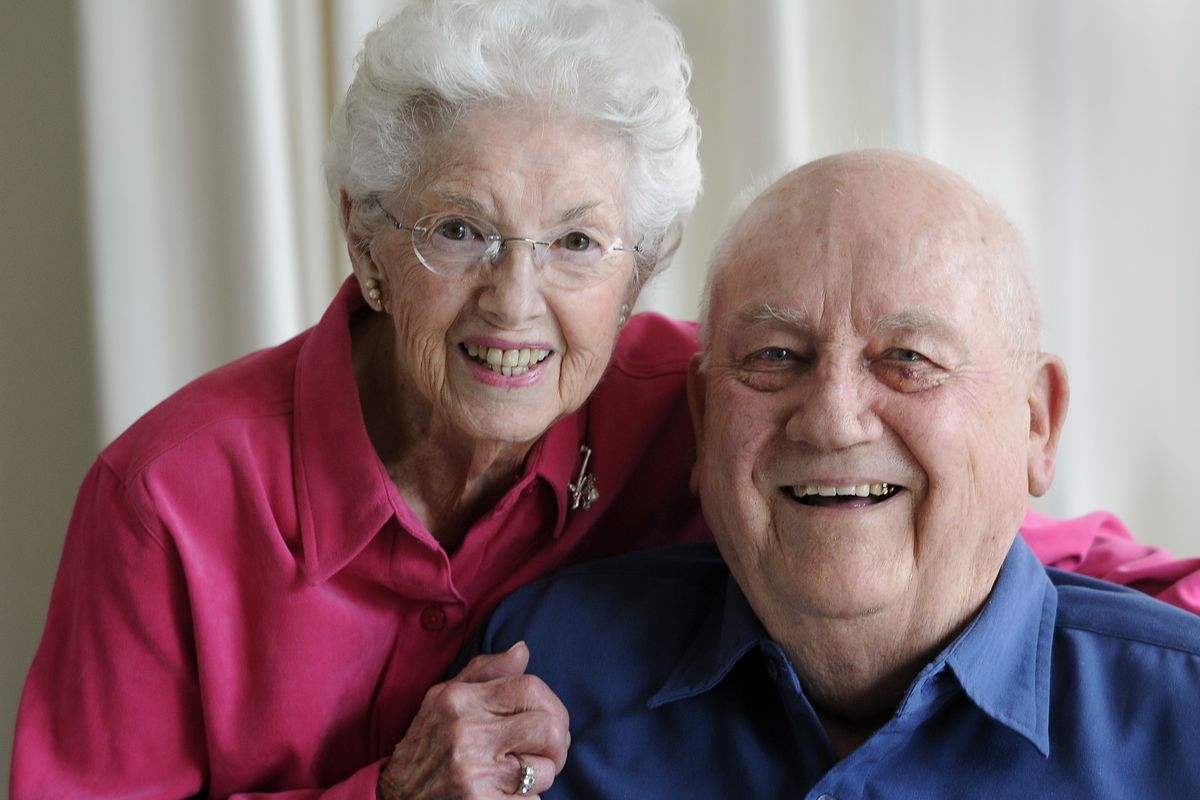War, religion can’t keep Spokane polka partners apart

The Pennsylvania Polka brought John and Christine Jasley together in Jacksonville, Fla., on Oct. 24, 1942.
Christine was dancing with a soldier when the first strains of the tune filtered out into the dance hall. “I don’t dance the polka, do you?” her partner asked. “Why, yes, I do,” she replied. The G.I. pondered the situation as they sat out the dance. Finally, he said, “I’ve got a buddy who can dance the polka; will you be here next week?”
“Sure,” she said, and promptly forgot the conversation.
But the soldier was true to his word. The next Saturday he and his buddy, John Jasley, were waiting for her. Christine and John danced the polka and several other dances. Then he said, “Close your eyes and hold out your hands.”
Christine wasn’t sure what to think but she did as he asked. And 68 years later, she smiled at the memory. “He put a little box of candy in my hand,” she said. John grinned at her from across the room. “She saved that candy until it turned white.”
The young soldier from New Jersey had enlisted in the Army Air Corps immediately after the bombing of Pearl Harbor and was trained as both a gunner and a radio operator.
After the dance, he invited her to see a movie with him the following week. She agreed. A few days later, he took the bus to her house and arrived early to find her dad waiting for him. Her father was reading the Wall Street Journal and he asked John’s opinion about various stocks and bonds. John shook his head. “I was a Depression-era kid who knew nothing about stocks.” However, he quickly decided to learn. “The next time he asked me I was going to know something,” he said.
And John had already decided Christine was an investment worth making. After their date, her father asked, “So, what did you think of that guy?” Knowing if she told him how much she liked John, her protective dad would find fault with him, she shrugged and said, “Oh, he’s OK.”
Her father said, “Well, he seemed to have more brains than most of the fellows you’ve been bringing around.”
Christine’s mother encouraged her to invite John for Thanksgiving dinner. Later, Christine found out he’d been accepted to flight school, but canceled his application so he could spend the holiday with her. “He told me he didn’t want to leave me, because he wasn’t sure I’d be there when he got back,” she recalled.
By Christmas, John told her he wanted to marry her. Christine initially said, “No you don’t.” She explained her reluctance, “He was Catholic and I was Protestant. I didn’t want him to give up his faith, and I didn’t want to be Catholic.”
In addition, they knew John would soon be sent overseas. Unlike many wartime couples, they didn’t want to marry, only to be separated. “If something happened to me over there … well, I didn’t want her to be saddled with that,” said John.
And the ever-practical Christine said, “We didn’t want to have a baby and then be apart.” Eventually, she accepted and agreed to wait for his return.
John was sent to Italy. “I only had to fly 35 missions, to get to go home, but I flew 50,” he said. “Some of them were ‘mulligans,’ – training missions, but we still got shot at.”
On one memorable mission John’s crew returned to base with 640 holes in its B-24. “They shot us up real bad,” he recalled. As he inspected his gear he noticed a tear in his parachute. “A hot piece of flak had gone through my flak vest, into my chute and fused into the nylon.” He still has that piece of flak – a reminder of the dangers he endured.
In October 1944, Christine got a call from a stevedore on a transport ship. “A rough voice said, ‘Your boyfriend is home,’ ” she recalled. “I said, ‘Who are you?’ And he said, ‘What the hell do you care? Your boyfriend’s home!’ ”
One month later they married. When asked how they resolved the issue of their conflicting religious backgrounds, Christine replied, “We didn’t.” While John was facing imminent peril overseas, he said he realized everyone – Catholic and Protestant alike – prayed to the same God. Unfortunately, both of their families disapproved of their union. So when John was discharged he accepted a job with National Cash Register in Reno, Nev., far from their parents. “We were afraid they’d interfere,” said Christine. The couple believes that long-ago decision contributed to the success of their union.
In 1946, Christine gave birth to a daughter and three years later, a son. Sadly, the baby boy lived for only a day. “That was the most difficult time of our lives,” said John.
National Cash Register transferred John to Spokane in 1957. He worked for the company 36 years before retiring at 62. Since that time, this couple, brought together by the Pennsylvania Polka made time for dancing, wine tasting and travel.
And 12 years ago, their conflict of faith question was finally resolved. “Our grandson was marrying a Catholic girl and we sat next to the priest at the rehearsal dinner,” Christine said. She and John told him that when they wed in 1944, they hadn’t been allowed to marry in the Catholic church. “Things are much different now,” the priest replied, and promptly offered to marry them the following morning before their grandson’s wedding. Fifty-three years after their first wedding, they were finally wed by a priest. Their grandson served as best man. When John called his mother to tell her the news, he said, “She was so happy she cried.”